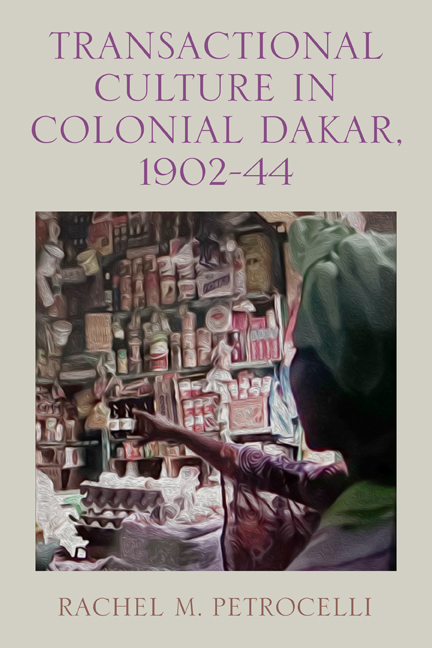Book contents
- Frontmatter
- Dedication
- Contents
- List of Illustrations
- Acknowledgments
- Introduction
- 1 Illusory Roots: Europeans, Autochthony, and Visions of a Capital City
- 2 The Rhetoric of Refoulement in Colonial Dakar
- 3 Challenges and Solutions of the Transient City
- 4 Impediments and Ingenuity in Financial Life
- 5 Ethnic Boundaries, Economic Niches, and Ambiguities in the Colonial City
- 6 The Lebanese and the Local in the Interwar Period
- 7 War’s Window: Urban Informality and Control
- Epilogue
- Bibliography
- Index
7 - War’s Window: Urban Informality and Control
Published online by Cambridge University Press: 08 May 2024
- Frontmatter
- Dedication
- Contents
- List of Illustrations
- Acknowledgments
- Introduction
- 1 Illusory Roots: Europeans, Autochthony, and Visions of a Capital City
- 2 The Rhetoric of Refoulement in Colonial Dakar
- 3 Challenges and Solutions of the Transient City
- 4 Impediments and Ingenuity in Financial Life
- 5 Ethnic Boundaries, Economic Niches, and Ambiguities in the Colonial City
- 6 The Lebanese and the Local in the Interwar Period
- 7 War’s Window: Urban Informality and Control
- Epilogue
- Bibliography
- Index
Summary
The Second World War as a Window
By the time of the Second World War, Dakar had become a city that coupled unique opportunities and specific barriers for those who lived there. Its fluidity, which frustrated officials, was an attribute that contributed not only to its diversity but also to the types of activities Dakarois pursued and the ways in which they did so. The war brought about two shifts in the dynamics of transactions in the colonial capital. War brought about shortages and rationing, which aggravated the “just enough” world in which Dakarois lived and catapulted the issue of daily needs to the forefront of city dwellers’ minds and actions. The terms of transactions and access to resources were central to urban everyday public discourse. The grievances of the urban population regarding their daily lives also moved into a new place of prominence in the state's spectrum of concerns. Wartime generated intensified surveillance, with greater attention to the happenings of daily life. The war thus serves as a window with a special view of the city; it permits an understanding of the depth and flexibility of the transactional culture. The state became more vigilant about tracking public sentiment and activity, raising their prominence in official documentation. Those sentiments and activities put even greater pressure on Dakarois in their transactional lives. As urgency set in, a growing range of unauthorized actions emerged in the city, and preexisting illicit practices became more prominent.
As the seat of the government of colonial French West Africa, Dakar took on particular roles during World War II. It served as a strategic base and, with the regime change in France, as a Vichy stronghold outside of France.1 Dakar became entrenched in the political and military struggles of the war, especially as it became a target of Allied and Free French efforts to erode Axis power in Africa.2 Amid a global war, France also relied on its African colonies to bolster its forces, bringing about new experiences for African servicemen and shifting dynamics between soldiers and the French colonial state.
- Type
- Chapter
- Information
- Transactional Culture in Colonial Dakar, 1902-44 , pp. 148 - 171Publisher: Boydell & BrewerPrint publication year: 2024

